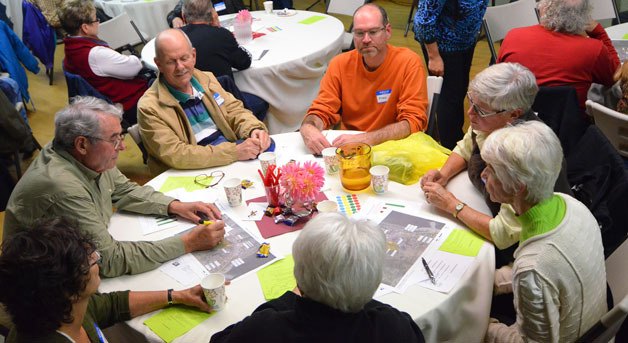Downtown Clinton is not dead, nor will it be anytime soon.
That was the collective sentiment of the sizable crowd of people who filled the Clinton Community Hall Thursday to discuss the tiny ferry town’s future.
“Rumors of Clinton’s demise are greatly exaggerated,” said Bob Craven, president of the Clinton Chamber of Commerce.
“Considering our size, we pack one hell of a punch,” he added, referring to the chamber’s membership growth in recent years.
But were those just hollow words of a community leader desperate to save a struggling town? Several other speakers at the meeting, members of the Clinton Community Council, said “No” and that the approximately 70 people seated around the room were evidence to the contrary.
“I think it indicates there is energy and enthusiasm for moving something forward,” said Sherryl Christie-Bierschenk, vice president of the Clinton Community Council.
Christie-Bierschenk has been one of the galvanizing forces behind an effort to revitalize Clinton. In January 2012, the Clinton Future Search Conference was held, and over a two-day period, a large group of residents and business owners brainstormed ways to improve the community’s future.
One offshoot of the conference was the birth of the Clinton Community Council. Composed of residents, merchants and representatives from county government and some junior taxing districts, such as the Port of South Whidbey, the group serves as an official voice for the area.
It was seen by many as a sorely needed step, as Clinton is not an incorporated city and lacks the central and cohesive voice of elected city councils in Langley, Coupeville and Oak Harbor.
The newly-formed community organization has just begun to take steps to improve Clinton’s overall health, but the going has been rough. This summer, two long-time businesses picked up shop and moved north, further reinforcing Clinton’s reputation as a town on the decline.
Steve and Kathy Schwenn, Clinton homeowners for 25 years, attended the meeting to find out what can be done. The town needs a way to attract and retain businesses but it’s no easy feat, they said.
“That’s the problem and how to solve that I don’t know,” Steve Schwenn said.
Thursday’s meeting was geared partly to answer that very question, as attendees were grouped together and asked to come up with new ideas. But the meeting also was an opportunity for local government to update residents about what they are doing to help.
Port Commissioner Curt Gordon, a member of the community council, addressed transportation goals in Clinton and Mukilteo, while also highlighting traveller statistics from a recent study which claimed that 71 percent of South Whidbey residents commute to jobs outside the port district.
Island County Commissioner Helen Price Johnson addressed plans for trail improvements, drainage projects and park updates while a planning official also talked about the county’s beginning effort to update its comprehensive plan.
“I think now is a really good time as a community to discuss this and set priorities for what you want to see done,” said Will Simpson, a planner with Island County Planning and Community Development.
Some of the people in attendance had big ideas. One unidentified woman said the “elephant in the room” was sewers.
“If you want businesses, you are going to need to be able flush, rinse, wash,” she said.
But others at the meeting were more leery about big plans to improve Clinton, especially plans involving pocketbooks.
“Frankly, if it involves any more of my money, ‘No,’ ” Shawne Carr said.
According to Price Johnson, money for some of the projects discussed, such as trail improvements and increased transportation links, is already available and won’t lighten wallets any more than they already do.
Carr and her husband, Michael Carr, said later that they support efforts to improve Clinton but that it only goes so far.
“I just think we need to focus on how much we are going to have to pay for it,” Michael Carr said.



